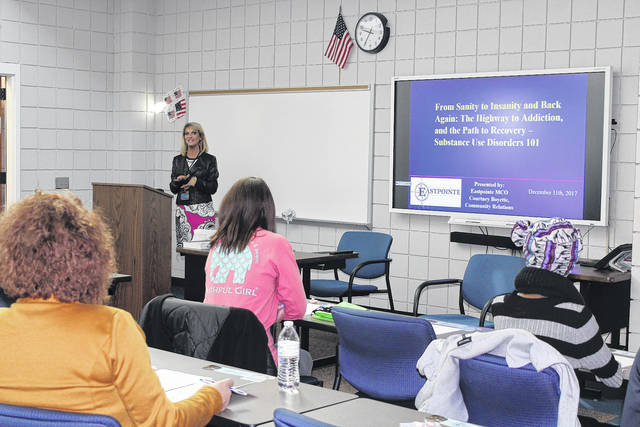Studies show that substance abuse is fueling a nationwide epidemic of unintentional drug overdose deaths, and health officials with Eastpointe are doing their part to help the community understand the process of addiction.
Courtney Boyette, community relations specialist with Easpointe, spoke at a Substance Abuse Summit at Sampson Community College about Substance Abuse Disorder, to educate those in law enforcement, the education system and health care system about the deadly disease. For 17 years, Boyette has worked to raise awareness of mental issues and substance abuse.
“There are a lot of misconceptions about addiction,” Boyette said. “Addiction to a substance can develop despite a person’s best intentions and their strength of character. No one ever says that when they grow up they want to be a drug addict.”
According to Boyette, there are many substances that are addictive, but the growing epidemic is the addiction to opioids. An opiate is the umbrella which covers a broad category and includes pills and pain relievers and heroin. Examples of an opiate are hydrocodone, morphine, oxycodone and other generic names like Lortab, Vicodin and Percocet.
Addiction, Boyette said, does not discriminate.
“We are seeing individuals who are middle to upper class, professional people,” Boyette attested. “We even work with individuals who have had multiple incarcerations, experienced homelessness, veterans, and involved with the court system. The majority of the people I work with don’t want to live the lifestyle they are living.”
Those suffering from Substance Abuse Disorder are more likely to begin to avoid certain situations, lie about their behaviors and hide the fact they drink or use drugs to any degree. Moving through the three stages of the disease, Boyette said the last stage usually happens when the addict begins to experience severe withdrawal symptoms, the health begins to deteriorate and they may even lose their job.
“Drug addiction is a brain disease that affects a person’s behavior,” Boyette explained. “It’s a chemical dependence and people almost never recover on their own.”
Addiction often begins after a person is prescribed pain medication for a legitimate surgery or injury. As the person takes the medication, their tolerance level increases, leading them to require more medication to get the same feeling as the first time the drug was used.
On the flip side, Boyette explained, the limited access to prescriptions is driving more people to the black market to purchase prescriptions, or heroin when other drugs are not readily available.
“We are also seeing an increase use of heroin, as it is cheaper than purchasing prescription medications which can be costly at street value,” Boyette said. “Individuals seeking treatment often report using a combination of both prescription pills and heroin.”
Boyette said it’s when a person is at their worst that they often come in and ask for help.
“There are many barriers for treatment,” Boyette said. “People are often ashamed and don’t want anyone to know they are sick and need help.”
And, there is no easy fix for addiction.
According to Boyette, the methadone clinic in Fayetteville sees an average of 1,500 people a day for their dosing. However, for those who are young, there is often no type of treatment.
“Treatment must last long enough to produce stable behavior changes,” Boyette explained.
To combat the growing problem of overdosing, Boyette said several agencies have partnered to raise awareness.
Local law enforcement, first responders and probation officers are being trained in crisis intervention to help prevent unintentional overdoses from leading to death. Additionally, Project Lazarus is a grant that Sampson County received and in collaboration with the health department will offer Narcan/Naloxone, a drug used to stop overdosing deaths from happening.

